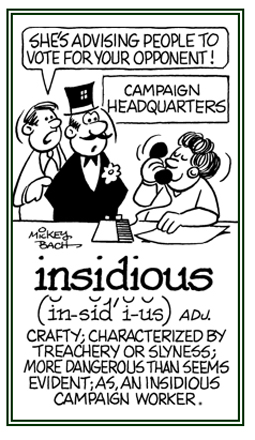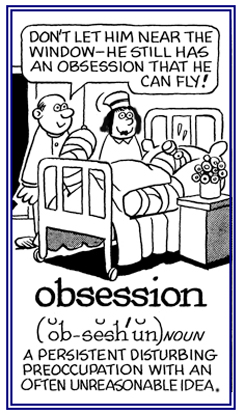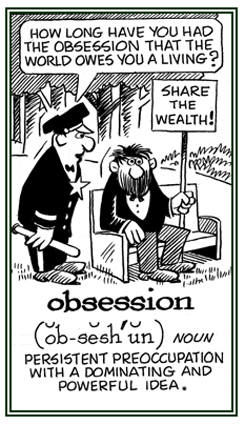sed-, sedat-, -sid, -sess
(Latin: sit, sitting)
2. Etymology: from Old French despossesser, "to dispossess", from des-, "dis-, lack of, not" + possesser, "possess" which stands forpots-sidere, literally "to sit as a master".
The first element is a contraction of potis, "able, mighty, powerful"; while the second element is related to sedere, "to sit" and "to sit down".

Go to this Word A Day Revisited Index
so you can see more of Mickey Bach's cartoons.
In totalitarian regimes, dissidents are often punished with lengthy prison terms, execution, economic deprivation, or confiscation of their property.
2. A person who is characterized by departing from accepted beliefs or standards: Political dissidents primarily use non-violent means of political disagreement, including voicing criticism of the government or a dominating ideology; but dissidents can also attempt to displace or overthrow the established government by achieving popular support and inciting a revolution or a rebellion.3. Etymology: From Latin dissidentem and dissidere, "to be remote, to disagree, to be removed from"; "to sit apart"; derived from dis-, "apart" + sedere, "to sit".
3. Relating to anyone who disagrees; especially, with a majority.
2. Stealthily treacherous or deceitful: The military commander told his staff that they were fighting an insidious enemy.
3. A reference to something that proceeds in an inconspicuous, subtle, stealthy, or seemingly harmless way, but which actually has a serious negative effect: Jim had an insidious disease which existed for some time, but even his physician was not aware of what was causing it.
Sometimes people have an insidious ailment, but they have no idea that they are infected.
4. Etymology: From Latin insidiosus, "deceitful", from insidae (plural) "plot, snare, ambush", from insidere, "to sit on, to occupy" from in-, "in" + sedere "to sit".

Go to this Word A Day Revisited Index
so you can see more of Mickey Bach's cartoons.
2. Having an imperceptible beginning, as of a disease with a late manifestation of definite symptoms.
2. Being a disease that progresses and is cumulative with few or no symptoms to indicate its seriousness.
2. To occupy someone's thoughts constantly, compulsively, and exclusively: The desire for revenge about the way she was treated so badly by her fellow workers obsessed Marge's sister for a long time.
3. Etymology: from Latin obsessus, past participle of obsidere, "to besiege, to occupy". Literally, "to sit opposite to", from ob, "against" + sedere "to sit".
Of evil spirits, "to haunt", is from 1540. Obsession was originally (1513), "the act of besieging", then "hostile action of the devil or an evil spirit" (1605). The meaning "persistent influence or idea" is first recorded in 1680.

Go to this Word A Day Revisited Index
so you can see more of Mickey Bach's cartoons.
2. Conveying or showing an excessive or compulsive concern with something or someone.
2. An irrational drive for performing trivial or repetitive actions even when the person doesn't want to: Harriet observed the woman in the public washroom who appeared to have an obsession about washing her hands because she was scrubbing her hands with soap and water and then doing it again and again.
3. The uncontrollable persistence of an idea or emotion in the mind, sometimes associated with a psychiatric disorder: The worrisome obsession which the military officer had that his telephone was being tapped by the government turned out to be true and so it was not just a mental health disorder.


Go to this Word A Day Revisited Index
so you can see more of Mickey Bach's cartoons.
2. Relating to, characteristic of, or causing a desire to do something: Shirley had an obsessive-gambling habit, on and off the internet.
3. An extreme degree or nature: The coach had an obsessive need and desire for his team to win every game they played.
People with obsessive-compulsive disorders often suffer from very strong feelings of having to do something that can't be controlled by themselves and so they also may have depressions and anxieties.
For a long time, obsessive-compulsive disorders have been treated with psychoanalysis or behavior therapy.


